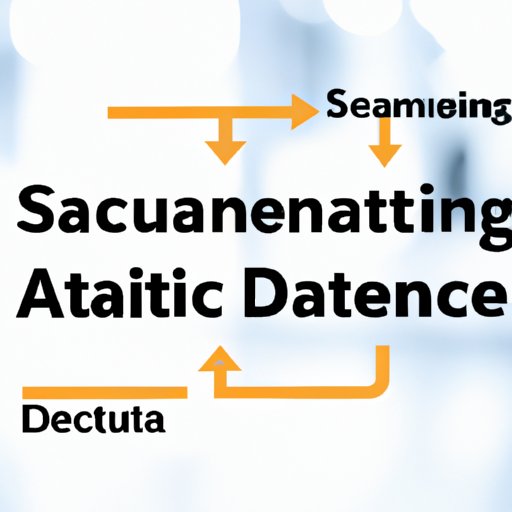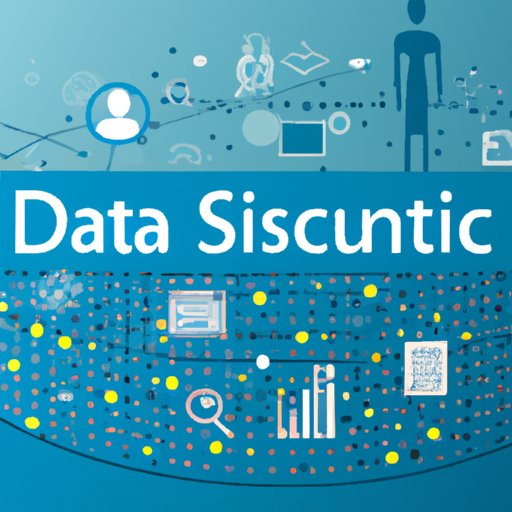Introduction
Data science is a field that combines mathematics, statistics, programming, and domain expertise to draw insights from large datasets. It is used in various industries to help businesses make informed decisions, automate processes, and develop predictive models. This article will explore how data science is used in business and the potential benefits, challenges and opportunities associated with it.
Exploring the Rise of Data Science in Business
In recent years, data science has become increasingly important in the business world. According to research by McKinsey & Company, “there is an urgent need for companies to use data science more effectively,” as it can provide businesses with new insights and improved decision making. As such, many organizations are investing in data science initiatives in order to gain a competitive advantage.
Benefits of Data Science for Businesses
Data science can provide businesses with numerous benefits. For example, it can help to identify trends in customer behavior and generate insights that can be used to improve products and services. Additionally, data science can be used to optimize processes, such as supply chain management and inventory control. Furthermore, data science can also be used to build predictive models that can help businesses anticipate customer needs and market changes.
Challenges Faced by Businesses When Utilizing Data Science
Despite the potential benefits of data science, there are also challenges that businesses must consider when utilizing it. For example, the accuracy of data science models depends on the quality of the data used, so businesses must ensure that their datasets are complete and up-to-date. Additionally, businesses must also have the necessary infrastructure and resources in place in order to effectively utilize data science. Finally, data science models can be complex and require significant time and effort to develop, so businesses must invest in the right personnel to ensure successful implementation.

Analyzing the Impact of Data Science on Decision Making
Data science can be used to inform decision making in a variety of ways. By analyzing large datasets, businesses can uncover patterns and trends that can help them make better decisions. Additionally, data science can be used to develop predictive models that can help businesses anticipate future outcomes and plan accordingly.
Overview of Data Science Tools Used to Make Decisions
There are several data science tools that businesses can use to make decisions. These include machine learning algorithms, natural language processing, and sentiment analysis. Additionally, businesses can also use data visualization tools, such as Tableau and Power BI, to create dashboards that can help them quickly understand complex datasets.
Understanding the Benefits and Limitations of Using Data Science to Make Decisions
Using data science to make decisions can provide businesses with numerous benefits. For example, data science can help businesses identify patterns and correlations that may not be immediately apparent. Additionally, data science can help businesses make decisions faster and more accurately than they could without it. However, data science can also present some limitations. For example, data science models can be complex and require significant time and effort to develop. Additionally, data science can only provide insights based on the data available, so businesses must ensure that their datasets are accurate and up-to-date.

Examining the Role of Data Science in Automation
Data science can be used to automate many processes within a business. By leveraging data science, businesses can streamline tasks such as customer service, marketing, and finance. Additionally, data science can be used to automate predictive models, allowing businesses to anticipate customer needs and market changes.
Understanding the Different Types of Automation Enabled by Data Science
Data science can be used to automate a variety of tasks. For example, businesses can use data science to develop automated customer service agents that can respond to customer inquiries. Additionally, businesses can also use data science to automate marketing campaigns, such as email marketing and social media campaigns. Finally, businesses can use data science to automate financial processes, such as invoicing and bookkeeping.
Investigating the Impact of Automation on Business Efficiency
Automating processes with data science can have a positive impact on business efficiency. According to a study by Deloitte, “automation can reduce operational costs by up to 25%, increase productivity by up to 50%, and improve customer satisfaction by up to 75%.” Additionally, automation can also help businesses reduce errors and improve compliance with regulations. As such, businesses should consider leveraging data science to automate processes in order to increase efficiency.
Investigating the Use of Data Science in Predictive Analytics
Data science can be used to develop predictive models that can help businesses anticipate customer needs and market changes. By leveraging data science, businesses can develop models that can accurately predict future outcomes and take proactive steps to capitalize on them.
Overview of How Predictive Analytics Works
Predictive analytics leverages data science to develop models that can predict future outcomes. These models are built using historical data, which is then used to identify patterns and correlations that can be used to forecast future events. Additionally, predictive analytics can also be used to uncover hidden relationships between variables, allowing businesses to identify new opportunities and risks.
Examining the Benefits and Limitations of Predictive Analytics
Predictive analytics can provide businesses with numerous benefits. For example, it can help businesses anticipate customer needs and develop targeted marketing campaigns. Additionally, predictive analytics can also help businesses identify potential risks and take steps to mitigate them. However, predictive analytics can also present some limitations. For example, the accuracy of predictive models depends on the quality and quantity of data used, so businesses must ensure that their datasets are complete and up-to-date.

Investigating the Benefits of Data Science for Big Data
Data science can be used to help manage and analyze large datasets, otherwise known as “big data.” By leveraging data science, businesses can quickly identify patterns and generate insights from large datasets. Additionally, data science can also be used to develop predictive models that can help businesses anticipate customer needs and market changes.
Overview of How Data Science Can Help Manage and Analyze Big Data
Data science can be used to manage and analyze large datasets. For example, businesses can use data science to develop algorithms that can process large amounts of data quickly. Additionally, businesses can also use data science to develop predictive models that can help them identify patterns and correlations in the data. Finally, businesses can use data science to generate insights that can be used to improve products and services.
Examining the Challenges of Utilizing Data Science for Big Data
Utilizing data science for big data can present some challenges. For example, the accuracy of data science models depends on the quality of the data used, so businesses must ensure that their datasets are complete and up-to-date. Additionally, businesses must also have the necessary infrastructure and resources in place in order to effectively utilize data science. Finally, data science models can be complex and require significant time and effort to develop, so businesses must invest in the right personnel to ensure successful implementation.
Evaluating the Potential of Data Science for Artificial Intelligence
Data science can be used to develop artificial intelligence (AI) applications that can help businesses automate processes and make better decisions. By leveraging data science, businesses can develop AI applications that can quickly analyze large datasets and generate insights that can be used to improve products and services.
Understanding the Role of Data Science in Artificial Intelligence
Data science plays an important role in developing AI applications. For example, data science can be used to develop algorithms that can process large amounts of data quickly and accurately. Additionally, data science can be used to develop predictive models that can help AI applications anticipate customer needs and market changes. Finally, data science can also be used to generate insights that can be used to improve AI applications.
Examining the Benefits and Limitations of Data Science for AI
Data science can provide businesses with numerous benefits when developing AI applications. For example, data science can help to identify patterns and correlations in large datasets that can be used to inform decision making. Additionally, data science can also be used to develop predictive models that can help AI applications anticipate customer needs and market changes. However, data science can also present some limitations. For example, the accuracy of AI applications depends on the quality of the data used, so businesses must ensure that their datasets are complete and up-to-date.
Conclusion
Data science can provide businesses with numerous benefits, such as improved decision making, increased efficiency, and the development of predictive models. Additionally, data science can also be used to automate processes, manage and analyze big data, and develop AI applications. Despite the potential benefits of data science, businesses must also consider the challenges associated with utilizing it, such as the need for accurate and up-to-date datasets. Therefore, businesses should carefully evaluate the potential benefits and challenges of data science before investing in data science initiatives.
Summary of Key Points
This article explored how data science is used in business, including its benefits, challenges and opportunities. It examined how data science can be used to make decisions, automate processes, analyze big data and enable artificial intelligence. Additionally, it highlighted the need for businesses to ensure that their datasets are accurate and up-to-date in order to make the most of data science initiatives.
Recommendations for Future Research
Future research should investigate how businesses can best utilize data science to maximize its potential benefits. Additionally, research should also examine the ethical implications of using data science in business, such as privacy concerns and the potential for bias in decision making. Finally, research should also explore how data science can be used to develop AI applications that are safe, secure, and compliant with regulations.
(Note: Is this article not meeting your expectations? Do you have knowledge or insights to share? Unlock new opportunities and expand your reach by joining our authors team. Click Registration to join us and share your expertise with our readers.)
